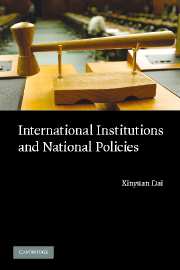Book contents
- Frontmatter
- Contents
- List of tables
- Acknowledgments
- 1 Introduction
- 2 The study of international institutions
- 3 Monitoring arrangements
- 4 Compliance mechanisms
- 5 The power of weak international institutions
- 6 Conclusion
- Appendix A Formal solutions
- Appendix B Ranking of signatory countries in LRTAP
- Bibliography
- Index
2 - The study of international institutions
Published online by Cambridge University Press: 22 September 2009
- Frontmatter
- Contents
- List of tables
- Acknowledgments
- 1 Introduction
- 2 The study of international institutions
- 3 Monitoring arrangements
- 4 Compliance mechanisms
- 5 The power of weak international institutions
- 6 Conclusion
- Appendix A Formal solutions
- Appendix B Ranking of signatory countries in LRTAP
- Bibliography
- Index
Summary
International agreements are an essential element in the increasingly interdependent world. Countries may agree to stop fighting one another, to reduce trade barriers, to protect the environment, or to respect human rights. Subsequent compliance with these agreements affects international cooperation not only in the short term, by affecting the immediate success of these agreements, but also in the longer term, by affecting the feasibility of future agreements. Compliance with international agreements is thus a critical component in international cooperation in general. How to secure compliance? How can the rising number of international institutions help facilitate states' compliance with international agreements? These issues have important theoretical and empirical implications.
This book addresses how international institutions influence international cooperation generally and facilitate states' compliance with international agreements specifically. The purpose of this chapter is to review important works in these areas. This review helps guide my research agenda and locate the contribution of this book in the appropriate context.
With vast theoretical and policy implications, issues concerning compliance and the role of international institutions have attracted the attention of IR scholars from diverse theoretical perspectives. Neoliberal institutionalism, in particular, has suggested analytically rigorous answers to the puzzle of compliance and the role of international institutions. However, due to its state-centric focus, studies in this literature tend to limit the scope with which international institutions may influence sovereign behavior in the interstate context.
- Type
- Chapter
- Information
- International Institutions and National Policies , pp. 13 - 32Publisher: Cambridge University PressPrint publication year: 2007

